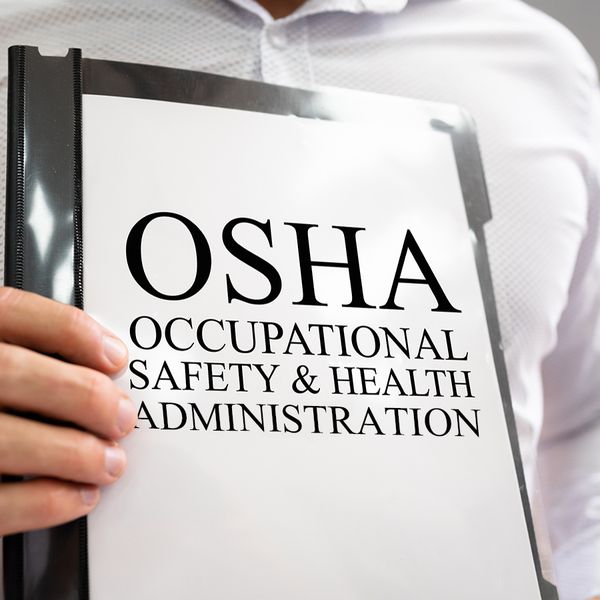OSHA keeps grip on rulemaking powers in huge court win for agency
OSHA has the authority, by law, to issue permanent safety standards. However, one employer had hoped the U.S. Court of Appeals for the Sixth Circuit would declare those powers unconstitutional and issue a permanent injunction to prevent OSHA from enforcing its standards.
In a vote of 2 to 1, the court sided with OSHA in Case No. 22-3772 on August 23. The court explains that through the Occupational Safety and Health (OSH) Act, Congress required OSHA to determine the standards needed to keep workers safe and healthy. The court adds that Congress gave OSHA significant discretion and a framework to do so. This delegation is constitutional, concludes the court opinion.
Background
The employer (plaintiff) in the case is a full-service, industrial general contractor. It is subject to the OSH Act and must comply with OSHA’s workplace safety and health standards. (Click on the link to learn about Who Is Covered by the OSH Act.) Note that OSHA has cited this contractor for $10,000 in relation to a catwalk injury in 2019.
As stated, the OSH Act gives OSHA the power to set occupational safety and health standards. Those standards require employers to meet “conditions, or the adoption or use of one or more practices, means, methods, operations, or processes.” The Act gives OSHA some boundaries, however. The conditions, practices, and so forth must be “reasonably necessary or appropriate to provide safe or healthful employment and places of employment.”
Yet, the plaintiff argued that those boundaries are not restrictive enough and, thus, the OSH Act is in violation of the “nondelegation doctrine.” That doctrine explains that the constitution forbids the delegation of legislative powers. Only Congress has the power to make laws. The plaintiff urged the court to determine whether Congress’ delegation to OSHA to set standards is constitutional.
What was Congress thinking when it passed the OSH Act?
The court majority said it must consider the context of the Act in making its decision. Accordingly, the opinion explains that when Congress passed the OSH Act in 1970, it found that “personal injuries and illnesses arising out of work situations” imposed a substantial burden on the economy. The overarching goal of the Act is, therefore, “to assure so far as possible every working man and woman in the Nation safe and healthful working conditions and to preserve our human resources.”
The OSH Act then lays out its specific purposes, including to:
- Reduce workplace-safety hazards,
- Increase research into better safety standards,
- Encourage states to improve their own safety standards, and
- Provide appropriate reporting procedures.
To meet those purposes, the Act gives the Secretary of Labor authority to set occupational safety and health standards.
Court uses a test to determine constitutionality
To figure out if a delegation is constitutional, courts have long used the “intelligible principle” test. That test argues, “If Congress shall lay down by legislative act an intelligible principle to which the person or body authorized to [act] is directed to conform, such legislative action is not a forbidden delegation of legislative power.”
In the latest case, the Sixth Circuit majority holds that OSHA’s delegation, in fact, passes the intelligible principle test. Hence, it is constitutional. The constitution does “not prevent Congress from obtaining the assistance of its coordinate Branches,” the opinion explains. The court points out that Congress may not delegate the power to make laws, but it may delegate the authority to make policies and rules that implement the laws.
Court adds that OSHA’s authority has limits
Some might argue that OSHA’s authority is unlimited. Yet, the opinion says that the Act puts boundaries on OSHA’s discretion in deciding whether it may issue a particular standard. OSHA cannot issue any standard it likes, the court contends. Rather, a safety risk must reach a level that requires some action for a safe workplace. In fact, by law, OSHA must issue standards in response to safety issues.
In addition, when OSHA does adopt standards, their conditions must be reasonably necessary or appropriate to improve workplace safety and health. Because safe does not mean risk-free, OSHA standards do not need to completely resolve the issue.
With the above parameters, Congress established the boundaries of OSHA’s delegated authority, the Sixth Circuit opinion said.
Court sides with OSHA
In sum, the court holds that the standards prescribed under the OSH Act are a constitutional delegation of authority. The 15-page opinion recaps by saying:
- While Congress gave OSHA significant discretion, that does not render the delegation unconstitutional; and
- The OSH Act provides an overarching framework to guide its discretion.
Key to remember
In a vote of 2 to 1, an appeals court said that Congress gave OSHA significant discretion and a framework to do so. This case affirms OSHA’s authority under the constitution to continue to set and enforce its standards under the OSH Act.



















































